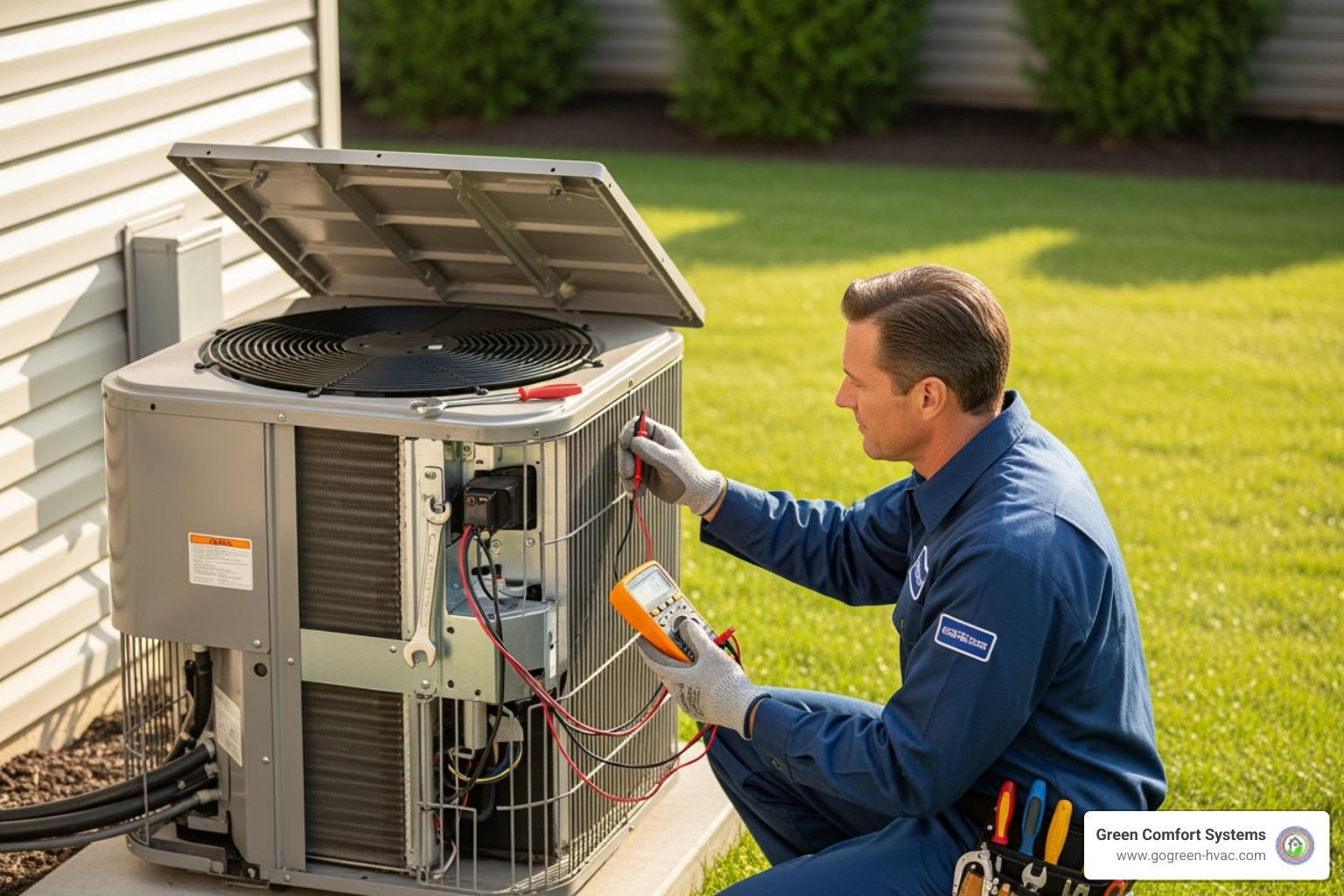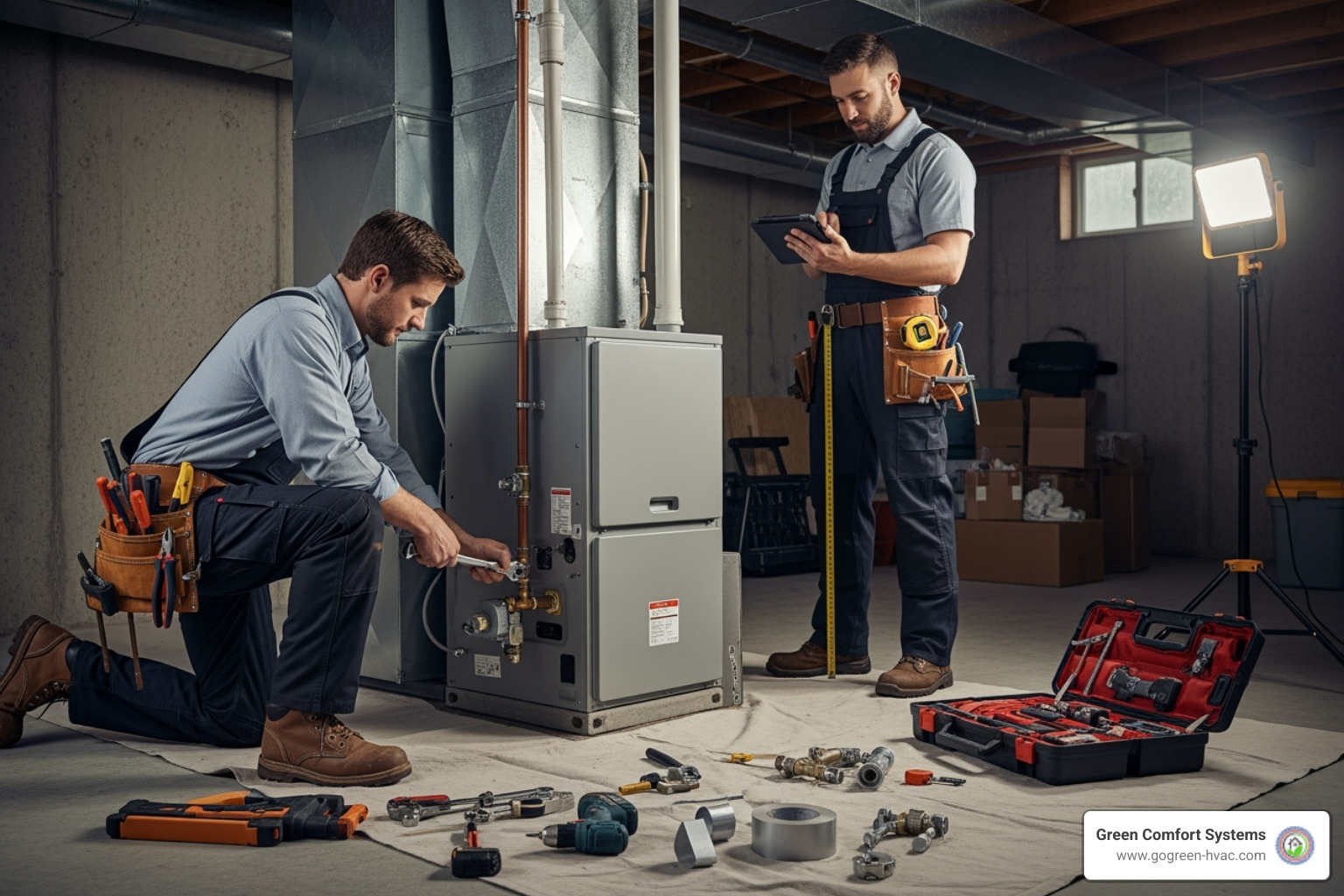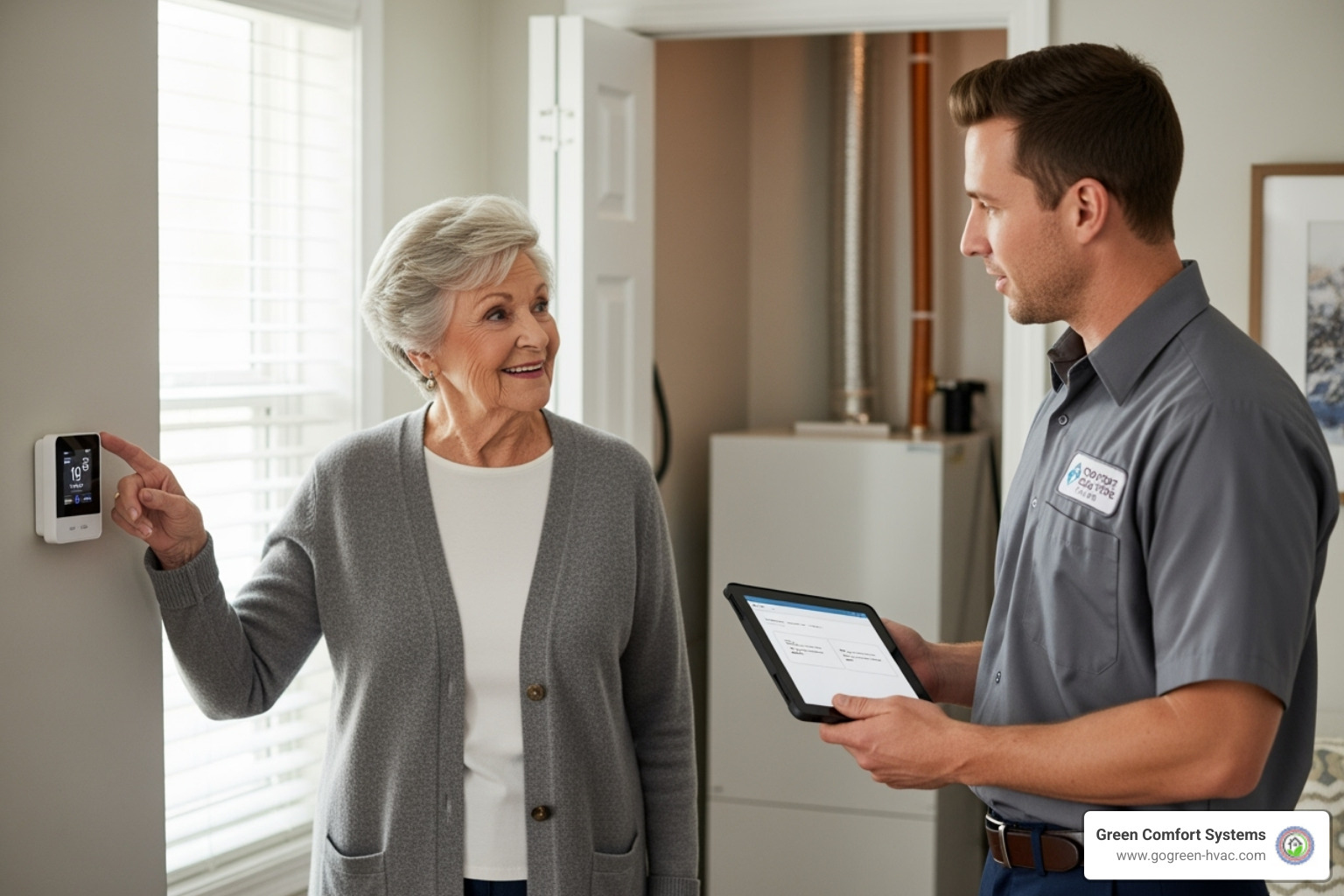Power Up Your Savings: A Guide to Energy Efficient Heat Pumps

Why Energy Efficient Heat Pumps Are Essential for Maryland Homeowners
An energy efficient heat pump is an HVAC system that can reduce your heating costs by up to 75% compared to traditional electric resistance heating. Instead of burning fuel, these systems move existing heat from the outside air into your home—even when it's freezing.
Key benefits of energy efficient heat pumps:
- Dual functionality: Provides both heating and cooling in one system.
- Massive energy savings: Up to 3 times more efficient than conventional heating.
- Lower carbon footprint: Reduces heating-related emissions by 40% on average.
- Better comfort: Superior dehumidification and consistent temperatures.
- Financial incentives: Federal tax credits up to $2,000 plus local rebates.
For Rosedale homeowners with high energy bills, heat pumps are a proven solution. With nearly half of the average $1,900 annual energy bill going to heating and cooling, a modern heat pump's ability to deliver three times more heat energy than the electricity it consumes offers significant savings.
The technology works year-round. In summer, it operates like a super-efficient air conditioner. In winter, it reverses to extract heat from outdoor air, with cold-climate models working in temperatures as low as 5°F. Whether you need an emergency replacement or are planning an upgrade, choosing the right heat pump can transform your home's comfort and cut energy costs.
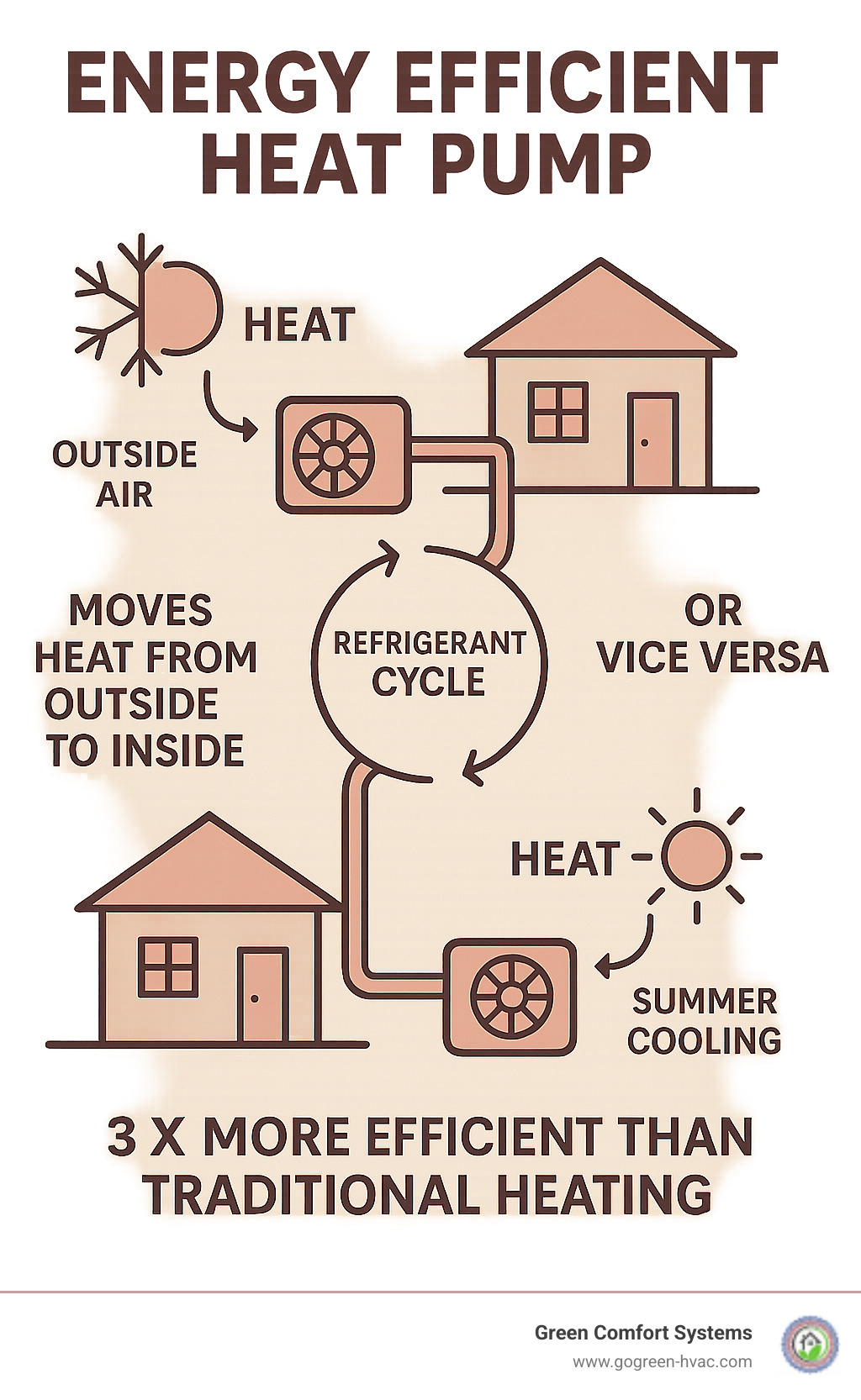
How Heat Pumps Work and Why They're Superior
An energy efficient heat pump works on the same principle as a refrigerator, moving heat from one place to another. It uses a refrigerant cycle to transfer heat, making it incredibly efficient.
In heating mode, the system pulls heat from the outdoor air—even when it's cold—and moves it inside. In cooling mode, a reversing valve flips the process, grabbing heat and humidity from inside your home and moving it outdoors. This process is far more efficient than traditional methods. While a high-efficiency gas furnace converts about 98% of its fuel to heat, a heat pump can deliver 300% more heat energy than the electricity it consumes.
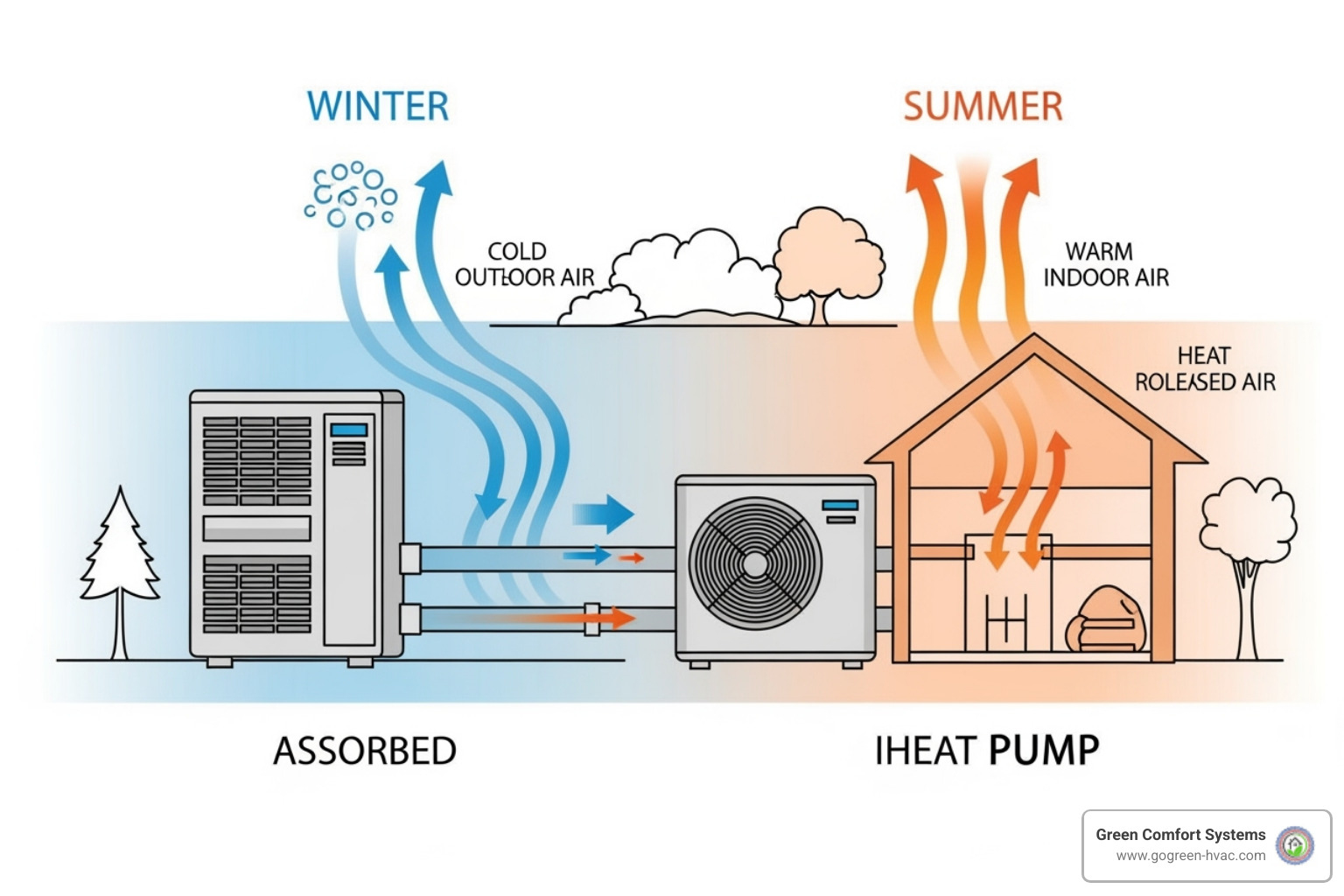
| Feature | Traditional Furnace (Heating) | Traditional AC (Cooling) | Energy Efficient Heat Pump (Heating & Cooling) |
|---|---|---|---|
| Energy Source | Natural Gas, Oil, Propane | Electricity | Electricity (moves heat, doesn't create it) |
| Efficiency | Up to ~98% (furnace only) | SEER 13-18 | Up to 300-400% (moves more heat than it consumes electricity) |
| Functionality | Heating only | Cooling only | Both Heating and Cooling |
| Carbon Footprint | Higher (combustion) | Moderate | Significantly Lower (moves heat) |
| Dehumidification | None | Standard | Excellent |
| Indoor Air Quality | Can introduce combustion byproducts | Standard | No direct emissions |
Key Benefits of an Energy Efficient Heat Pump
Choosing an energy efficient heat pump offers significant advantages for Maryland homeowners:
- Cost Reduction: These systems can reduce your electricity use for heating by up to 75% compared to electric resistance heaters, leading to substantial monthly and long-term energy savings.
- Lower Carbon Footprint: By moving heat instead of burning fossil fuels, heat pumps cut heating-related emissions by about 40% compared to gas furnaces. At Green Comfort Systems, this aligns with our mission to plant a tree for every service call and installation.
- Improved Comfort: High-efficiency models excel at dehumidification, making humid Maryland summers more comfortable. This also leads to improved indoor air quality with no direct combustion emissions like carbon monoxide. You get year-round comfort from a single, efficient system.
Understanding the Main Types of Heat Pumps
The right heat pump depends on your home's needs.
- Air-source heat pumps are the most common type, transferring heat between your house and the outside air. They can be ducted systems that connect to existing ductwork or ductless mini-split systems for homes without ducts or for zoning specific rooms. More info about ductless systems can help you decide if this flexible option is right for you.
- Ground-source (geothermal) heat pumps use the stable temperature of the earth for heat exchange. They are exceptionally efficient and long-lasting but require significant excavation and investment, making them less practical for many properties. For most Maryland families, an air-source system is the most cost-effective choice.
The Ultimate Guide to Choosing an Energy Efficient Heat Pump
Selecting the right energy efficient heat pump requires careful consideration of your home's specific needs to ensure reliability and efficiency.
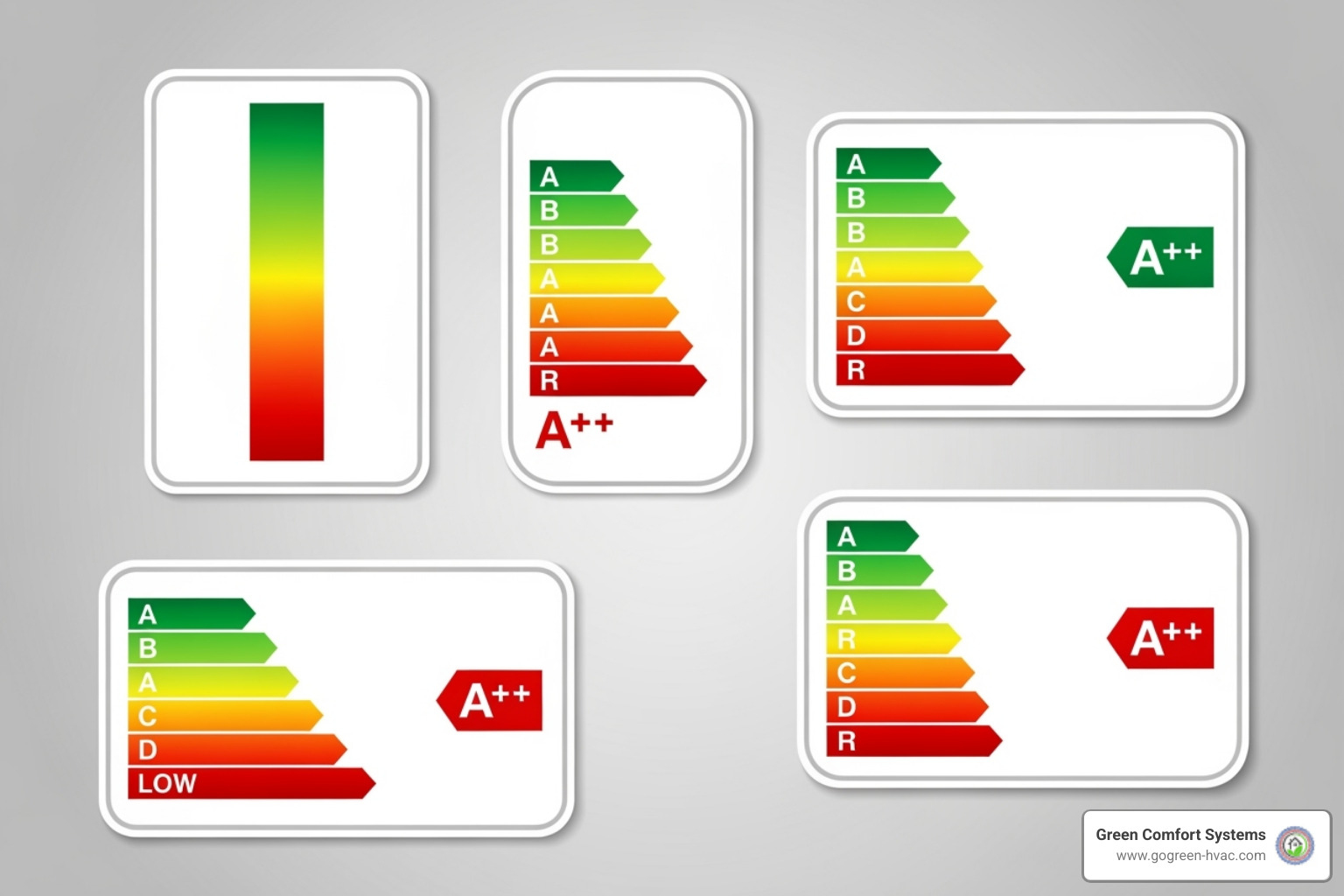
Sizing and Climate Considerations
Proper sizing is critical. A professional load calculation (using methods like Manual J) is essential to determine the correct capacity for your home.
- An oversized unit will cycle on and off frequently, wasting energy and failing to properly dehumidify your home.
- An undersized unit will struggle to maintain comfort during extreme weather, increasing energy costs.
Improper sizing drastically reduces efficiency, regardless of the unit's rating. Maryland's climate zones also influence the best choice. Cold climate heat pump technology has models that perform efficiently down to 5°F and even lower. Many high-efficiency systems use variable-speed compressors, which adjust output to match your home's needs precisely. This provides consistent temperatures, superior dehumidification, and maximum energy savings.
Decoding Efficiency Ratings: SEER, HSPF, and COP
Understanding these ratings helps you compare models:
- SEER (Seasonal Energy Efficiency Ratio): Measures cooling efficiency. Higher numbers mean lower cooling bills. Ratings range from 14 to over 40.
- HSPF (Heating Seasonal Performance Factor): Measures heating efficiency. Higher numbers mean more efficient heating. Ratings typically range from 7.1 to 13.2.
- COP (Coefficient of Performance): Shows how many units of heat are delivered for each unit of electricity used. A COP of 3 means 300% efficiency.
You may also see SEER2 and HSPF2, newer standards from 2023 that offer a more accurate reflection of real-world performance.
The ENERGY STAR Advantage
The ENERGY STAR label is your guarantee of independent certification and performance. These certified heat pumps meet strict EPA efficiency guidelines, ensuring guaranteed energy savings and climate protection. The program's Most Efficient list highlights the top-performing models available each year. For more details, visit ENERGY STAR Certified Heat Pumps.
Installation, Maintenance, and Hybrid Systems
Once you've selected your energy efficient heat pump, proper installation and maintenance are key to its long-term performance and savings.
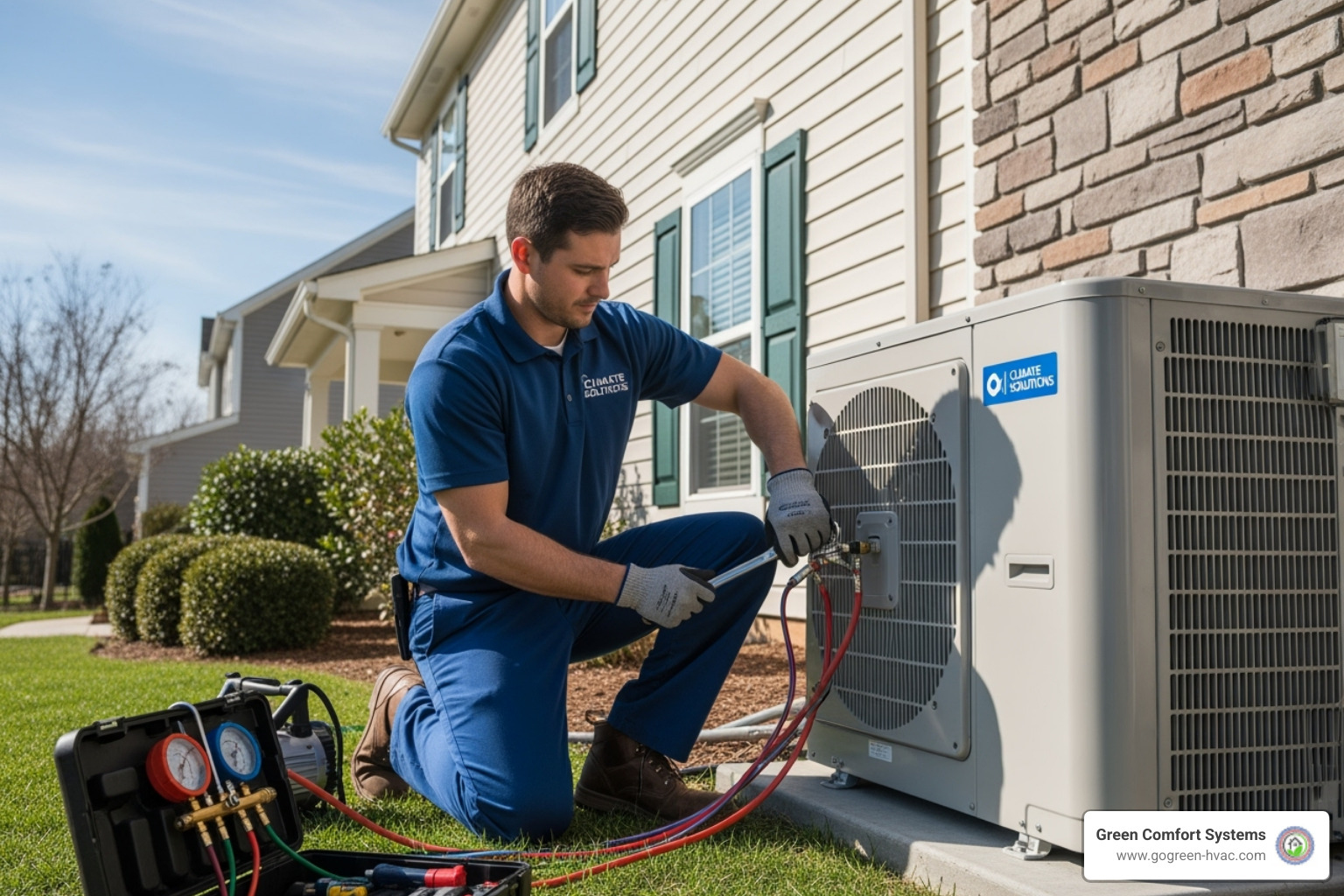
The Importance of Professional Installation
Professional installation is as crucial as the unit itself. A qualified contractor, like the NATE, ACCA, and BPI certified technicians at Green Comfort Systems, will ensure every step is done right. This includes:
- Precise load calculations to determine the exact size system your home needs.
- Ductwork inspection to identify and seal leaks or recommend modifications for optimal airflow.
- Electrical service check to confirm your home's panel (often 200-ampere service is needed) can safely support the new system.
Proper installation guarantees peak performance, validates your warranty, and meets local codes. Our HVAC maintenance plans can keep your system running efficiently for years.
Maximizing Savings with Your Energy Efficient Heat Pump
Regular maintenance keeps your heat pump efficient and your energy bills low.
- Change filters regularly: A clogged filter makes your system work harder. Check it monthly and replace it when dirty.
- Keep the outdoor unit clear: Ensure at least 2-3 feet of clearance around the unit, free of leaves, snow, and debris.
- Schedule annual professional tune-ups: A technician will clean coils, check refrigerant levels, and inspect components to ensure peak efficiency.
- Optimize thermostat settings: Heat pumps are most efficient at maintaining a steady temperature. Use a programmable thermostat for moderate setbacks (around 4°F) and set the fan to 'auto'.
Do You Need a Backup? Understanding Hybrid Systems
While a modern energy efficient heat pump can handle most of Maryland's winter, a backup system can provide peace of mind during extreme cold.
- Auxiliary heat strips are electric resistance heaters built into the indoor unit. They turn on automatically when the heat pump needs assistance but use more electricity.
- A dual-fuel system combines a heat pump with a gas or oil furnace. The heat pump runs during milder weather for maximum efficiency, and the system automatically switches to the furnace when temperatures drop to a pre-set "economic balance point."
We can help you determine if a backup system is a cost-effective solution for your home.
Open uping Savings: Costs, Rebates, and Tax Credits
While an energy efficient heat pump has an upfront cost, the long-term savings on your energy bills can be substantial, often providing a quicker payback period than homeowners expect.
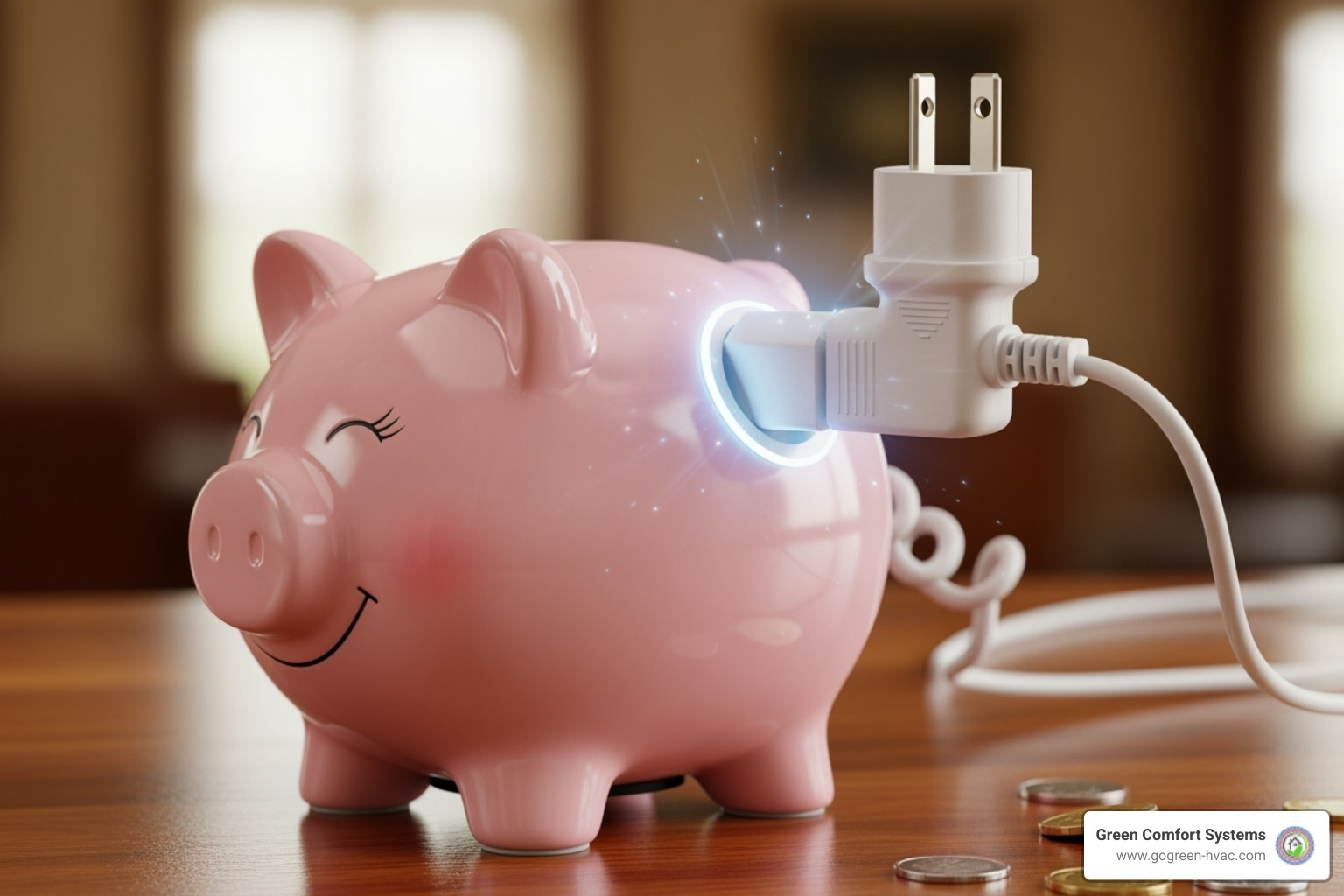
The average household spends nearly half its annual $1,900 energy budget on heating and cooling. A heat pump can cut those costs by up to 75%, leading to significant monthly savings that accumulate over the system's 10-15 year lifespan.
Better yet, you don't have to shoulder the full cost alone. Excellent incentives are available to reduce your initial investment.
Federal Tax Credits and Local Incentives
The federal government offers powerful incentives for homeowners to upgrade to high-efficiency systems.
The Energy Efficient Home Improvement Credit is a direct, dollar-for-dollar reduction of your tax bill. You can get a tax credit worth 30 percent of the cost to purchase and install a qualifying heat pump, up to a maximum of $2,000 per year. This credit is available through 2032.
In addition to federal credits, many state and local utility companies offer their own rebates and incentives. These programs, which can include cash rebates or low-interest financing, vary by location. We stay current on all available programs to maximize our customers' savings. You can also research programs in your area through the Database of State incentives to homeowners.
When you combine federal credits, local rebates, and long-term energy savings, an energy efficient heat pump becomes a compelling and smart financial decision for your home.
Frequently Asked Questions about Heat Pumps
We understand you have questions about making the switch to an energy efficient heat pump. Here are answers to the most common ones we hear from Maryland homeowners.
How long does an energy-efficient heat pump last?
Most air-source heat pumps have a typical lifespan of 10 to 15 years, similar to traditional HVAC systems. Geothermal systems last even longer, with indoor components lasting 20-25 years and underground loops lasting over 50 years. Key factors affecting longevity include the quality of the installation, proper sizing, and, most importantly, regular professional maintenance. An annual tune-up is the best way to extend your system's life and ensure it runs efficiently.
Can a heat pump work in very cold weather?
Yes. This is a common misconception based on older technology. Today's cold-climate models are engineered to perform well in freezing temperatures. These advanced systems can maintain strong heating capacity down to 5°F, and many can still provide heat at -20°F. While their efficiency decreases in extreme cold, they are designed to handle the vast majority of a Maryland winter. For the coldest days, supplemental heat (like electric heat strips or a furnace in a dual-fuel system) can provide backup if needed.
Are heat pumps noisy?
Modern energy efficient heat pumps are remarkably quiet. Most have sound ratings of 76 decibels or lower, which is comparable to a normal conversation. The biggest improvement comes from variable-speed technology, which allows the system to run at lower, quieter speeds for longer periods instead of loudly cycling on and off. Proper installation on a stable, level pad also ensures minimal noise and vibration. You can enjoy a peaceful home without the disruptive noise of older HVAC units.
Conclusion
We hope this guide has shown how an energy efficient heat pump can benefit your Maryland home. By moving heat instead of creating it, these systems offer a path to significant savings, superior comfort, and a smaller environmental footprint.
You could see up to 75% savings on heating costs while enjoying year-round comfort from a single system. With federal tax credits covering 30% of your investment (up to $2,000), there has never been a better time to upgrade.
At Green Comfort Systems, we believe choosing a heat pump is about taking control of your energy future. It's a commitment we share, which is why we plant a tree for every service and installation.
However, research alone isn't enough. Professional guidance is essential for proper sizing, installation, and maintenance to ensure your system's performance and longevity. Our team has helped countless homeowners across Rosedale, Baltimore, and surrounding communities achieve the comfort and savings a heat pump provides.
Ready to start saving and upgrade your comfort? Schedule your heat pump installation in Essex, MD today!. We proudly serve families in Catonsville, Dundalk, Ellicott City, Forest Hill, Glen Burnie, Halethorpe, Joppa, Middle River, Perry Hall, Severna Park, Towson, and communities throughout Maryland.
Book Expert Service Or Contact Us
Other Blogs





Get Financing Today
Get the comfort you deserve, without the financial stress.

Latest Blogs







